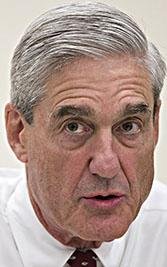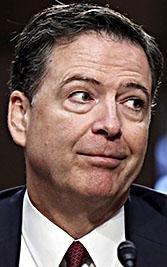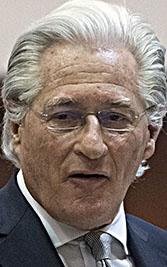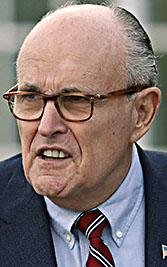WASHINGTON -- Lawyers for President Donald Trump criticized former FBI Director James Comey in a confidential memo last year to the special counsel, casting him as "Machiavellian," dishonest and "unbounded by law and regulation."
The letter, obtained by The Associated Press, underscores the effort by Trump's legal team over the past year to target Comey's reputation and pit the president's word against that of the former FBI director. Comey's firing in May 2017 helped set in motion the appointment of special counsel Robert Mueller, and one-on-one conversations with Trump that Comey documented in a series of memos helped form the basis of Mueller's inquiry into whether the president obstructed justice.
The June 27, 2017, letter was written by Marc Kasowitz, then the president's lead lawyer, as Mueller and his team were in the early stages of their investigation into Trump associates and as they had begun examining whether the president, by firing Comey, had sought to stymie an FBI investigation into the Trump campaign's ties to Russia.
As justification for the firing, the White House initially pointed to a Justice Department memo that faulted Comey for his handling of the Hillary Clinton email investigation, though Trump later said that "this Russia thing" was on his mind when he made the move.
It's not clear to what extent, if any, the attacks on Comey have resonated with Mueller's team, which is broadly investigating Russian meddling in the 2016 presidential election and continues to seek an interview with the president to assess whether he had a corrupt intent when he fired the FBI director. Even in the face of withering criticism, Comey has been largely consistent in his telling of his interactions with Trump in his memos, his book and numerous press interviews he's given in recent months.
The 13-page document provides a window into the formation of a legal strategy that remains in use today by Trump's lawyers -- to discredit Comey's value as a witness. It could have new relevance after a Justice Department inspector general report that criticized Comey for departing from established protocol in the Clinton investigation.
The letter aims to identify for Mueller what the lawyers believe are grievous errors both in how Comey handled the Clinton investigation and in his early, limited encounters with the president. In it, Kasowitz argues that Comey cannot be trusted as a witness because he repeatedly embellished his testimony before Congress, put his "own personal interests and emotions" above FBI protocol and left a cloud of undue suspicion above the president's head.
"Over the last year, Mr. Comey has engaged in a pattern of calculated unilateral action unbounded by governing law, regulation and practice, and plainly motivated by personal and political self-interest," wrote Kasowitz, who has since stepped aside as lead lawyer.
Lawyers for Comey declined to comment Saturday, as did Peter Carr, a spokesman for Mueller. Kasowitz and Trump lawyer Jay Sekulow did not immediately return messages, and former Trump attorney John Dowd declined to comment.
The document, unlike other correspondence between Trump lawyers and Mueller's team, does not dwell on questions of Trump's guilt or innocence. Instead, it casts in a negative light actions that Comey has said he carefully reasoned and that he has vigorously defended in his book and in interviews. Those include the decision to announce without Justice Department consultation the conclusion of the Clinton investigation, and the decision months later to brief Trump -- then the president-elect -- on allegations about him in a dossier.
"Mr. Comey continued his Machiavellian behavior after President Trump was elected," Kasowitz wrote.
Among the principal lines of attack are Comey's acknowledgment that he provided his lawyers with contemporaneous memos about his interactions with Trump and authorized one of them to share details with the news media. In one such encounter, Comey said the president asked him at a private dinner for his loyalty and that Comey offered him "honest loyalty" instead.
"There is no 'honest loyalty' in an FBI Director surreptitiously leaking to civilians his privileged and confidential conversations with the president, or misappropriating and disseminating his confidential FBI memos or their contents about those meetings," Kasowitz wrote. "There is no 'honest loyalty' in using those civilians as surrogates to feed stolen information and memos to the press to achieve a personal, political, and retributive objective of harming a sitting president."
The New York Times earlier reported that Kasowitz had written two letters to Mueller in June 2017, and it published one in which he rejected the idea that Comey's firing could constitute obstruction of justice. The AP obtained a copy of the other document, in addition to a two-page memo from September in which Trump lawyers lament to Deputy Attorney General Rod Rosenstein that Mueller was "inexplicably" not investigating Comey's "misconduct" they had earlier raised.
The June letter obtained by the AP castigates Comey for usurping the authority of his Justice Department bosses by announcing the conclusion of the Clinton investigation without seeking their approval, a criticism echoed by the inspector general last month. Comey has said he made the announcement alone because of concern that Justice Department leadership was seen as politically compromised.
Though the inspector general's office faulted Comey for some of his decisions, it did not find that FBI actions in the case were tainted by political bias.
NEW CONDITIONS
On Friday, Trump's lawyers set new conditions on an interview with the special counsel and said the chances that the president would be voluntarily questioned were growing increasingly unlikely.
Before Trump would agree to an interview, Mueller needs to prove that he has evidence that Trump committed a crime and that his testimony is essential to completing the investigation, said Rudy Giuliani, the president's lead lawyer in the case.
Giuliani acknowledged that Mueller was unlikely to agree to the interview demands. Giuliani appeared to be in part trying to shift responsibility onto the special counsel for the lengthy negotiations over an interview.
"If they can come to us and show us the basis and that it's legitimate and that they have uncovered something, we can go from there and assess their objectivity," Giuliani said. He urged the special counsel to wrap up his inquiry and write an investigative report. He said Trump's lawyers planned to write their own summary of the case.
A spokesman for the special counsel's office declined to comment.
The move by Giuliani was the latest maneuver in an all-out effort by the president and his legal team in recent months to alter public opinion about the inquiry.
To that end, Trump has publicly complained about the investigation more frequently in recent months -- tweeting about a "witch hunt" 59 times since March, compared with 20 times in all of 2017 -- and Giuliani regularly appears in the media to criticize the investigation.
Trump's lawyers are quietly more combative, too, contesting a request from the special counsel to interview John Kelly, the White House chief of staff. Emmet Flood, the lead White House lawyer in dealing with the investigation, has demanded to know what investigators want to ask Kelly and has tried to narrow the scope of their questions. A month after the request was made, Kelly has not been questioned, though a White House official said he was willing to be.
"That's the new position. If they had made the request eight months ago, they would have said yes because they thought there was a group of people on Mueller's team who had an open mind and were objective," Giuliani said of the president's previous lawyers, most of whom have left the legal team.
"Nobody is going to consider impeachment if public opinion has concluded this is an unfair investigation, and that's why public opinion is so important," Giuliani said.
Information for this article was contributed by Eric Tucker and Chad Day of The Associated Press; and by Michael S. Schmidt and Maggie Haberman of The New York Times.
A Section on 07/08/2018



